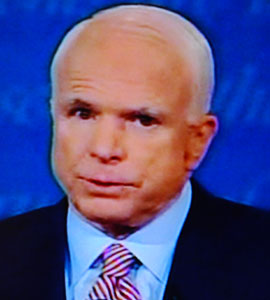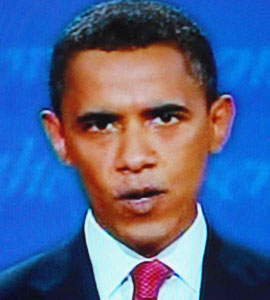 After much drama over whether Republican presidential Senator John McCain would show up, the first presidential debate was held last night between McCain and Senator Barack Obama, the Democratic Party candidate on the campus of the University of Mississippi in Oxford. The setting itself served as a historic frame; given the symbolism of “’Ole Miss” in the struggle for Blacks’ civil rights in the 1960’s, and almost fifty years later, the presence of the first Black nominee for President of the United States on its campus.
After much drama over whether Republican presidential Senator John McCain would show up, the first presidential debate was held last night between McCain and Senator Barack Obama, the Democratic Party candidate on the campus of the University of Mississippi in Oxford. The setting itself served as a historic frame; given the symbolism of “’Ole Miss” in the struggle for Blacks’ civil rights in the 1960’s, and almost fifty years later, the presence of the first Black nominee for President of the United States on its campus.
From the outset the picture of the two candidates told a story. The senior, white male war veteran and the young, Black male, intellectual; an image some would say of the nation’s past and its future, whether that future is November 4 or some inevitable point in the years to come. What was clear when both candidates took the stage last night is more than anything else the 2008 election is about generational change.
The two candidates faced each other after three days of backroom presidential politics that had Senator McCain announcing he would forgo the first debate to focus on the economic crisis and Senator Obama insisting the two of them keep their appointment to square off at the University of Mississippi. In the midst of the chaos over the economic meltdown President Bush summoned both candidates to an emergency meeting at the White House with other congressional leaders on Thursday. When it became apparent that there would be no deal on President Bush’s mortgage bailout proposal, Senator McCain was left with little with no card to play and agreed at the last minute Friday to be at the debate.
The debate was originally pegged to focus on foreign policy but the moderator, PBS’ Jim Lehrer, made clear that the topic included the global financial crisis. It was on that early point that McCain and Obama attempted to draw contrasts between each other. McCain struck a familiar theme that has been core to the message of conservatives for forty years, cut federal spending as way to get the government’s fiscal house in order. The Arizona senator harped on Congressional earmarks, the practice of Members designating funds for preferred projects, and accused Senator Obama of being supportive of so-called “pork” spending. McCain insisted, “Who fought against wasteful and earmark spending? Who has been the person who has tried to keep spending under control? “
 For his part Senator Obama took aim at the inequities in the tax system and reiterated his call for a tax cut that would relieve the burden on middle class taxpayers and shift it to higher income Americans; a reversal of the Bush cuts. He also suggested that as President he would close corporate tax loophole. When Senator McCain suggested that American businesses were already paying high taxes relative to other developed nations, Obama also took aim at Senator McCain and tied the Republican to the policies of the Bush administration. Senator Obama charged, “Here's the problem: There are so many loopholes that have been written into the tax code, oftentimes with support of Senator McCain, that we actually see our businesses pay effectively one of the lowest tax rates in the world.” Responding to his rival’s criticism of his support for earmarks, Senator Obama indicated that while he thought wasteful spending should be eliminated he took aim at projects pushed by corporate lobbyists.
For his part Senator Obama took aim at the inequities in the tax system and reiterated his call for a tax cut that would relieve the burden on middle class taxpayers and shift it to higher income Americans; a reversal of the Bush cuts. He also suggested that as President he would close corporate tax loophole. When Senator McCain suggested that American businesses were already paying high taxes relative to other developed nations, Obama also took aim at Senator McCain and tied the Republican to the policies of the Bush administration. Senator Obama charged, “Here's the problem: There are so many loopholes that have been written into the tax code, oftentimes with support of Senator McCain, that we actually see our businesses pay effectively one of the lowest tax rates in the world.” Responding to his rival’s criticism of his support for earmarks, Senator Obama indicated that while he thought wasteful spending should be eliminated he took aim at projects pushed by corporate lobbyists.
Both candidates did a delicate dance around the question of whether they would support President Bush’s bailout proposal, though at one point Senator McCain blurted out “yes,” while suggesting his support would be conditional if certain steps are taken first. In response to moderator Jim Lehrer’s question, Senator Obama detailed several steps he would take to stem the nation’s economic crisis if elected. Obama called for energy independence and investment in alternative energy sources such as wind, solar and biodiesel. Obama said, “We have to have energy independence, so I've put forward a plan to make sure that, in 10 years' time, we have freed ourselves from dependence on Middle Eastern oil by increasing production at home, but most importantly by starting to invest in alternative energy.” He also stressed the need to fix the health care system, better science and technology education, and an investment in the nation’s infrastructure as ways to resuscitate the economy.
Senator McCain returned to his position that government spending must be cut but then took one step further and said he would freeze all spending except on defense, entitlement programs and veterans’ affairs. Senator Obama later responded, calling the Bush administration’s budgetary policies as an “orgy of spending” that the Democrat claimed Senator McCain has supported over the last eight years. McCain also criticized Senator Obama’s health care proposal and cast doubt on the federal government’s ability to deliver quality health care; a Republican talking point meant to paint Democrats as supportive of a bloated federal bureaucracy. In his rebuttal, Senator Obama answered, “We right now give $15 billion every year as subsidies to private insurers under the Medicare system. Doesn't work any better through the private insurers. They just skim off $15 billion. That was a give away and part of the reason is because lobbyists are able to shape how Medicare works.”
It was on the question of the nation’s role in the Middle East that drew sharp distinctions between the two candidates. Senator McCain, who took the first question on the subject, he sought to take credit for the troop surge in Iraq that he claimed has stabilized the country. He did not back away from his support of the Iraq War but instead sought to blame the Bush administration for a faulty strategy and take credit for pushing the administration in a different direction. The Arizona Republican declared, “Our initial military success, we went in to Baghdad and everybody celebrated. And then the war was very badly mishandled. I went to Iraq in 2003 and came back and said, we've got to change this strategy. This strategy requires additional troops, it requires a fundamental change in strategy and I fought for it. And finally, we came up with a great general and a strategy that has succeeded.”
Senator Obama referenced his early opposition to the war and questioned not the strategy but the legitimacy of the war itself. He stated from the outset, “Well, this is an area where Senator McCain and I have a fundamental difference because I think the first question is whether we should have gone into the war in the first place.” Obama painted Iraq as a distraction and insisted that the Bush administration took its eyes off of Afghanistan, the place where the Democratic nominee insisted the focus should be in the war on terrorism. Senator Obama said, “We've spent over $600 billion so far, soon to be $1 trillion. We have lost over 4,000 lives. We have seen 30,000 wounded, and most importantly, from a strategic national security perspective, al Qaeda is resurgent, stronger now than at any time since 2001.” The senator added, “We took our eye off the ball. And not to mention that we are still spending $10 billion a month, when they have a $79 billion surplus, at a time when we are in great distress here at home, and we just talked about the fact that our budget is way overstretched and we are borrowing money from overseas to try to finance just some of the basic functions of our government.”
In one of the testier exchanges, Senator McCain repeated a charge that was made against Senator Obama during the primary election season; that Obama had failed to fulfill his oversight responsibility as chairman of a Senate subcommittee. McCain charged, “Senator Obama is the chairperson of a committee that oversights NATO that's in Afghanistan. To this day, he has never had a hearing.” As he did in the primary campaign, Senator Obama responded quickly to a point that was meant to paint him as irresponsible. He replied, “Look, I'm very proud of my vice presidential selection, Joe Biden, who is the chairman of the Senate Foreign Relations Committee, and as he explains, and as John well knows, the issues of Afghanistan, the issues of Iraq, critical issues like that, don't go through my subcommittee because they're done as a committee as a whole.”
It was also clear that the two candidates differed sharply on Afghanistan and Iraq, and how they would go about fighting terrorism in the former and the development of nuclear weapons in the latter. Obama did not shy away from earlier statements on Pakistan and that country’s role in hunting down al Qaeda. As one of the points he made on how best to confront terrorism, Senator Obama said,” Number three, we've got to deal with Pakistan, because Al Qaida and the Taliban have safe havens in Pakistan, across the border in the northwest regions, and although, you know, under George Bush, with the support of Senator McCain, we've been giving them $10 billion over the last seven years, they have not done what needs to be done to get rid of those safe havens.”

today in black history
March 11, 2025
Civil rights leader Rev. Ralph David Abernathy,colleague of Dr. Martin Luther King, Jr., was born in 1926 in Linden, Alabama.
Obama, McCain mix it up in first debate
Square off on foreign policy
POSTED: September 27, 2008, 12:00 am

























